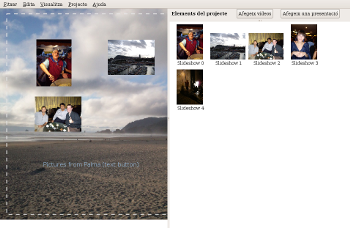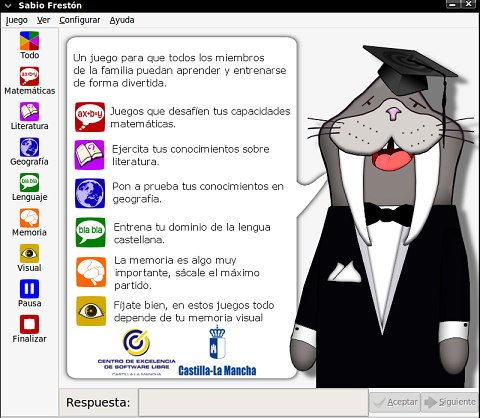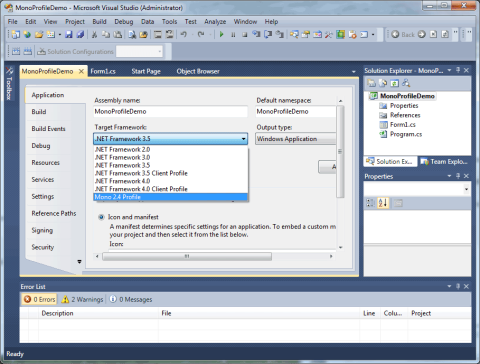StackOverflow DevDays in Boston
Joel Spolsky and Jeff Atwood have invited me to participate on StackOverflow's DevDays in Boston on October 7th.
I will be talking about Mono, Mono and Visual Studio and Mono on iPhone. Come equipped with questions.
Shocking, I know.
Posted on 17 Jul 2009
LLVM powered Mono
Mono from SVN is now able to use LLVM as a backend for code generation in addition to Mono's built-in JIT compiler.
This allows Mono to benefit from all of the compiler optimizations done in LLVM. For example the SciMark score goes from 482 to 610.
This extra performance comes at a cost: it consumes more time and more memory to JIT compile using LLVM than using Mono's built-in JIT, so it is not a solution for everyone.
Long running desktop applications like Banshee and Gnome-Do want to keep memory usage low and also would most likely not benefit from better code generation. Our own tests show that ASP.NET applications do not seem to benefit very much (but web apps are inherently IO-bound).
But computationally intensive applications will definitely benefit from this. Financial and scientific users will surely appreciate this performance boosthttp://www.mono-project.com/.
Taking it out for a spin
Note: the notes here are no longer relevant, these applied to Mono back in 2009. LLVM has now been integrated into Mono, follow the steps in http://www.mono-project.com/Mono_LLVM instead
You need to install both LLVM and Mono from SVN.
Get and install LLVM like this:
$ svn co http://llvm.org/svn/llvm-project/llvm/trunk llvm $ cd llvm $ ./configure --prefix=/mono --enable-optimized $ make && make install
Then get Mono, and you need to apply a tiny patch to configure.in.
$ wget https://tirania.org/tmp/m7a9da378.txt $ svn co svn://anonsvn.mono-project.com/source/trunk/mcs $ svn co svn://anonsvn.mono-project.com/source/trunk/mono $ cd mono $ patch -p1 < m7a9da378.txt $ ./autogen.sh --prefix=/mono --enable-llvm=yes $ make && make install
Now you have an LLVM-powered Mono.
LLVM is not able to support some of the features that Mono needs, so in those cases the JIT compiler will still fall back to Mono's JIT engine (methods that contain try/catch clauses or methods that do interface calls).
This backend was written by Zoltan.
Posted on 16 Jul 2009
Banshee as a Platform?
Aaron Bockover recently discussed Banshee's modular architecture. Aaron discusses using Banshee as a foundation for managing not only music, and videos but merging with F-Spot to manage photos as well:

The slides from his talk go into a bit more detail.
Jonathan Pobst takes the platform idea one step further and suggests that Banshee's core could also be used to replace YAST's Software Installer UI:

Jonathan says:
Every time I use YaST's Software Manager, I wonder if it would be better implemented using Banshee. Banshee's interface has been tuned for usability, both on its own, and what it borrows from iTunes. Software management is a naturally scary operation, and using an interface that the user is already familiar with could help reduce user fear.Of course, it would just be the interface pieces of Banshee in a new app, you wouldn't actually start Banshee for software installation.
Another feature I would like to see taken from iTunes/Banshee is downloading/installing in the background. Once I hit Install, go ahead and download the application in the background, and install it in the background. I can click on the "Downloading/Installing.." menu item if I want to see what's going on. Most of the time, I'd rather be looking at other things to download.
I think this is a brilliant idea.
Posted on 15 Jul 2009
From Microsoft: C# and CLI under the Community Promise
First the big news: Microsoft will be applying the Community Promise patent licensing to both C# and the CLI.
The announcement was done by Peter Galli at Microsoft over at Port25 and it states (emphasis is mine):
I have some good news to announce: Microsoft will be applying the Community Promise to the ECMA 334 and ECMA 335 specs.ECMA 334 specifies the form and establishes the interpretation of programs written in the C# programming language, while the ECMA 335 standard defines the Common Language Infrastructure (CLI) in which applications written in multiple high-level languages can be executed in different system environments without the need to rewrite those applications to take into consideration the unique characteristics of those environments.
"The Community Promise is an excellent vehicle and, in this situation, ensures the best balance of interoperability and flexibility for developers," Scott Guthrie, the Corporate Vice President for the .Net Developer Platform, told me July 6.
It is important to note that, under the Community Promise, anyone can freely implement these specifications with their technology, code, and solutions.
You do not need to sign a license agreement, or otherwise communicate to Microsoft how you will implement the specifications.
The Promise applies to developers, distributors, and users of Covered Implementations without regard to the development model that created the implementations, the type of copyright licenses under which it is distributed, or the associated business model.
Under the Community Promise, Microsoft provides assurance that it will not assert its Necessary Claims against anyone who makes, uses, sells, offers for sale, imports, or distributes any Covered Implementation under any type of development or distribution model, including open-source licensing models such as the LGPL or GPL.
You can find the terms of the Microsoft Community Promise here.
I told you this was good news!
A few months ago we approached Bob Muglia and Brian Goldfarb (@bgoldy) at Microsoft with a request to clarify the licensing situation for the ECMA standards covering C# and the CLI (also ISO standards, for the ISO loving among you).
Previously Microsoft had detailed the patent license plans and today they have delivered on those plans.
Astute readers will point out that Mono contains much more than the ECMA standards, and they will be correct.
In the next few months we will be working towards splitting the jumbo Mono source code that includes ECMA + A lot more into two separate source code distributions. One will be ECMA, the other will contain our implementation of ASP.NET, ADO.NET, Winforms and others.
Depending on how you get Mono today, you might already have the this split in house or not.
Thanks to everyone at Microsoft that worked to get this approved and released. We appreciate that they made this a priority when we approached them, and we know that everyone in the .NET team was also incredibly busy with various betas: .NET 4, Visual Studio 2010, Silverlight, MVC, MEF and much more.
I am overflowing with joy right now. Cheers!
Update: Send your thanks to @bgoldy on tweeter, who crossed all the t's and dotted all the i's to make this happen.
Update: Moderation of comments is taking place. Off topic messages will be removed immediatly. Trolling, as mild as it might be will be deleted. If you want to argue what language is the best one take the debate to a newsgroup.
Posted on 06 Jul 2009
PhyreSharp runs on the PS3
Mono on the PS3 has been making some nice progress. Supporting the PS3 requires some special features in Mono, for instance, a static compiler for .NET code for the PowerPC/Cell processor.
PhyreSharp, our .NET binding to Sony's PhyreEngine game engine ran on Thursday for the first time.
Posted on 03 Jul 2009
Some Cool Mono Announcements
Yesterday we shipped Mono 2.4.2, our long-term supported version of Mono. It ships Microsoft's opensourced ASP.NET MVC stack for the first time (you could get it before on your own, but now it is integrated) and fixes over 150 reported bugs.
Chris Toshok announced M/Invoke a tool to port applications that use P/Invokes on Win32 to Linux and MacOS.
What Chris does not talk about on his post is that he was trying to use some .NET software that interfaces via USB to his glucose meter and was trying to get this to run on Linux. The tool is mostly .NET with the usual handful of P/Invokes to Win32. And this is how M/Invoke was born: a tool to retarget P/Invoke happy applications into becoming pure managed applications.
This opens new doors to forcefully port more apps to Linux.
Alan McGovern released a new version of Mono.Nat one of the libraries used by MonoTorrent.
Jordi Mas released a new version of Mistelix a DVD authoring tool for Linux:

Jordi's GBrainy brain teaser game was picked up by MoLinux, a regional Linux distribution, and shipped it translated to Spanish:

Joe Audette's mojoPortal was being installed four times as much when it got included in in Microsoft's Web Platform Installer site (more stats here).
For years I have loved the Joel on Software rules for software engineering. And one of those rules is "Build in one step". We have not always succeeded, but we have always tried. Lluis delivers the one step to build and run for MonoDevelop on Windows: Load solution, Hit F5, up and running.
Google Chrome really lead the way here, and I want very badly to have all of Mono building in Visual Studio with one keystroke, but we are not there yet.
Stephane reports on some nice startup performance improvements for F-Spot. Loading time for 10 images from Stephane's own image collection went from 1.2 seconds to .5 seconds.
MonoDevelop got some enhanced support for autoconf integration.
Jeremy Laval released another version of ZenComic a desktop Comic reader:

David Siegel announced a new release of Gnome Do on behalf of the Gnome Do team. In particular, it is now easier to write "Docklets" for the Gnome Do panel and for those of us that like the Emacs keybindings, it is now possible to use C-N and C-P for navigation

And of course the Google Summer of Code is in full swing:

And we have various very exciting projects brewing.
Jonathan Pobst has been exploring integration points for Mono and Visual Studio 2010:

Guadec: I will sadly not be attending the Guadec/Akademy conference in Canaria next week. This is going to be a busy summer for us as we are shipping a lot of code in the next few months: Moonlight 2.0, Mono for Visual Studio, MonoTouch 1.0 and Mono 2.6.
Posted on 30 Jun 2009
MonoSpace Conference Announced

Scott Bellware has announced the MonoSpace Conference in Austin Texas on October 27-30th.
Scott has made a Call for Speakers:
The Monospace Conference is looking for teachers to give tutorials on the Mono framework, tools, languages, and platforms supported by Mono.Some tutorials are aimed at .NET developers with little experience with operating systems other than Windows, and others are geared to experienced Mono developers with exposure to the various Mono platforms.
The tutorials are two hour to three hour interactive sessions that can be any combination of follow-along examples, labs, and lecture.
We're looking for tutorials on subjects such as Linux, Mac, Windows, web, desktop, servers, message queues, databases, iPhone, Android, Amazon's EC2, among others.
You can track the progress of the conference at the MonoSpace Conf Blog.
You can also follow the progress on twitter.
Scott was one of the founders of the Alt.Net series of conferences.
Posted on 30 Jun 2009
Mono


Posted on 29 Jun 2009
PhyreEngine, Mono, cool Mono uses in Gaming, and more.
Last week there was a little Mono surprise. It can be found on this Novell-hosted web page web page (scroll a little bit).
It has been a few very busy weeks at Novell's Eastern Research and Development Facility (Novell NERD Facility) here in Cambridge and we have been incredibly busy polishing some nice toys.
A few weeks ago we learned about Sony's developer event in the West Coast. Michael, Zoltan and myself worked very hard to put together a demo to show the virtues of C# and the CIL to developers. So we cranked on some record time some code:
- PhyreEngine#
- Static compiler for PowerPC for Mono on PS3
- A yield-based co-routine framework.
We picked Sony's PhyreEngine to demostrate how to use Mono to write the high-level code for a game using Sony's finely tuned engine. We figured this was better than showing a for loop printing the numbers 1 to 10 on the screen.
PhyreEngine# wraps PhyreEngine using the same techniques that we used in Gtk# and Moonlight. The resulting API is glorious and by letting PhyreEngine do all the heavy lifting while driving all the high-level from C# there is no way of telling that the driving force is not C++. All you get is pure unadultered productivity.
To make our demos a little more interesting, Michael wrote a minimalistic yield-based co-routine framework inspired by some of the ideas that our friend Lucas gave us. It is a tiny toy, but we used it to illustrate the concept of using C# iterators as the foundation for game logic development and how a cooperative scheduler would work (Unity game logic works just like this).
We were also working on completing Mono's port to the PlayStation 3's native operating system (this is different than running Mono on Linux on the PS3: that already works, and it was used for developing CellDotNet, a JIT for the PS3's SPUs). Zoltan developed the static compiler for PowerPC and I did the platform support.
Mono can now run "Hello World" on the PS3 native OS. There are still lots of ins, lots of outs and lots of whathaveyous that need to be tied up before this fully works and before we are able to run PhyreEngine# on the PS3.
Posted on 08 Jun 2009
Developing Cross Platform application with MonoDevelop
Yesterday Lluis announced the last missing piece from our strategy to make MonoDevelop a full cross-platform IDE: MonoDevelop now runs on Windows as well:

When we started the planning for MonoDevelop 2.2, the major goal of that release was to get feature parity on Linux, MacOS and Windows.
We want to grow the community of developers that contribute to MonoDevelop and we wanted to attract add-in developers that wanted to bring their IDE extensions to all three platforms.
MonoDevelop has recently been getting some nice community contributed plugins like Flash/Flex development support, Vala language support, Mono debugger for OSX (thanks to the nice folks at Unity for this!), VI editing mode and of course our own Silverlight and ASP.NET MVC add-ins.
My theory is that supporting MonoDevelop on all the three major operating systems will have a multiplication effect in terms of contributions to MonoDevelop: it will help both users and will enable developers that extend MonoDevelop with add-ins to reach more users.
I secretly want Unity to adopt MonoDevelop as the code editor for Unity; for the FlashDevelop guys on Windows to adopt MonoDevelop as their cross-platform foundation (their users want a cross platform Flashdevelop); for Flashbang to bring their UnityScript framework to MonoDevelop
Developing an add-in for MonoDevelop now brings your enhancements to a much larger community.
Look and Feel
Although the IDE is built using Gtk#, but we are aware that developers want to get things integrated with their operating system as much as possible. This is why we have invested in properly integrating MonoDevelop with the Mac and Windows.
The Look of MonoDevelop still has a heavy feel of the Linux Gtk+, but we are bluring the lines by making the theme and style match the operating system. Development in Gtk native themes will also continue to improve things.
Feel wise, we make MonoDevelop follow the conventions of the host platform. For example, on the Mac, MonoDevelop uses the Mac system menu, it uses an entirely different keybinding style that follows what every Mac developer expects (Command-KEY operations that match X-Code for example) and even text selection in the editor behaves differently:

More work will come, because we want MonoDevelop to feel native on each platform.
On Windows for example, MonoDevelop runs on top of the .NET Framework and uses the .NET managed debugger instead of using Mono's runtime and Mono's debugger, so there is no dependency on Mono to be installed on the system.
Posted on 04 Jun 2009
« Newer entries | Older entries »
Blog Search
Archive
- 2024
Apr Jun - 2020
Mar Aug Sep - 2018
Jan Feb Apr May Dec - 2016
Jan Feb Jul Sep - 2014
Jan Apr May Jul Aug Sep Oct Nov Dec - 2012
Feb Mar Apr Aug Sep Oct Nov - 2010
Jan Feb Mar Apr May Jun Jul Aug Sep Oct Nov Dec - 2008
Jan Feb Mar Apr May Jun Jul Aug Sep Oct Nov Dec - 2006
Jan Feb Mar Apr May Jun Jul Aug Sep Oct Nov Dec - 2004
Jan Feb Mar Apr May Jun Jul Aug Sep Oct Nov Dec - 2002
Jan Feb Mar Apr May Jun Jul Aug Sep Oct Dec
- 2022
Apr - 2019
Mar Apr - 2017
Jan Nov Dec - 2015
Jan Jul Aug Sep Oct Dec - 2013
Feb Mar Apr Jun Aug Oct - 2011
Jan Feb Mar Apr May Jun Jul Aug Sep Oct Nov Dec - 2009
Jan Feb Mar Apr May Jun Jul Aug Sep Oct Nov Dec - 2007
Jan Feb Mar Apr May Jun Jul Aug Sep Oct Nov Dec - 2005
Jan Feb Mar Apr May Jun Jul Aug Sep Oct Nov Dec - 2003
Jan Feb Mar Apr Jun Jul Aug Sep Oct Nov Dec - 2001
Apr May Jun Jul Aug Sep Oct Nov Dec